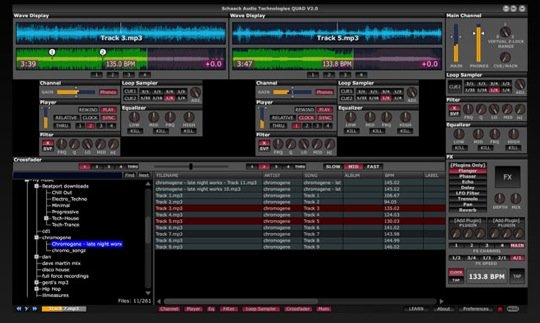
We’ve got another competitor in the digital DJ realm. This time Schaack introduces Quad 2, an open architecture Digital Vinyl System (DVS) that could prove to be a low cost rival to proprietary hardware devices such as Serato Scratch Live, M-Audio Torq, and Native Instruments Traktor.
More features and video after the jump.
Rather than using it’s own hardware interface, Quad 2 work with any ASIO compatible soundcard with enough inputs and outputs. Another key selling point is that DJ’s wanting to add further complexity to their performances can utilize up to 4 decks rather than the standard 2 deck solution.
Notable Features:
- Allows connecting turntables directly to Line Inputs on the soundcard
- Nearly every parameter is MIDI controllable
- MIDI feedback for endless rotary MIDI controllers or motorized fader MIDI controllers
- Resizable and completely user-configurable GUI: Channels may be shown/hidden, EQ/Filter/asf. may be shown/hidden
- Support of MP3s and WAVs
- Tempo-synchronization of up to 4 tracks using SYNC
- 1-deck support to mix up to 4 tracks
- External MIDI Clock may be used as tempo sync source to sync Quad with drum machines or sequencers
- Virtual Zero Lock Range makes pitch 0 really 0 and virtually eliminates the "resting point" at pitch 0 on old turntables
- Recording the mix as .WAV (16 or 32 Bit) during mixing is possible
- Keyboard shortcuts allow using Quad without touching the mouse
- Preview Player for fast prelistening of tracks on Headphones
- 3-band Equalizers with parametric mids from 100Hz to 10kHz
- Tempo-matched FX (Flanger,Phaser,Echo,Delay,LFO Filter,…)
- Tempo-matched Loop Samplers
- Any audio material (real Vinyl/CD’s/Mic/…) may be routed from the soundcard’s inputs into Quad for mixing and FX-processing
- Crossfader with 3 curves
- ID3 Tags are editable
- 4 assignable Cue Points per track
- Compatible with Windows XP, Vista, and Mac OS.
Quad 2’s full price of 89€ (approximately $130 US) includes 4 pieces of Timecode Vinyl with replacement vinyl available for $21 each.
Head over to Schaack to download the free limited feature demo.
When I read “open architecture” I was thinking source code available, able to run on Linux/BSD, or any OS with the right environment and available libraries.
Though I’m on OS X, a Linux compatible DVS would be majorly cool.
I agree… I’m a huge fan of Linux as well (although the motherboard on my laptop running Ubuntu died a couple of days ago). With the popularity of Linux and other Unix derivatives, I’m sure we’ll see an open source DVS at some point in the near future.